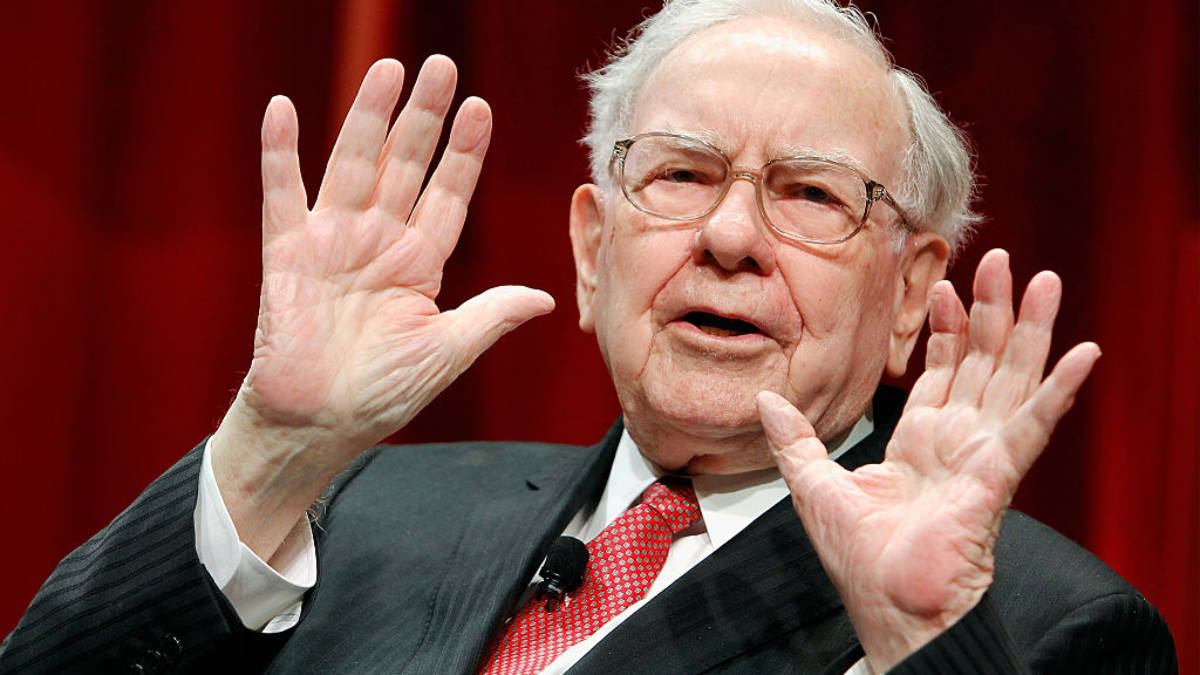Southeast Asia’s largest bank DBS; a Fidelity Bitcoin ETP; Warren Buffett… big things are happening in crypto

Indirectly investing in "rat poison"? Berkshire Hathaway CEO Warren Buffett. (Getty Images)
Last year was massive for institutional crypto adoption and that shows no sign of slowing down in 2022, with Fidelity International, DBS and even Warren Buffett (sorta) making moves in the digital assets realm this week.
Let’s start with the “Oracle of Omaha”…
Warren Buffett and co. ape further into crypto-friendly NuBank
Is Warren Buffett changing his highly negative tune on crypto? Probably not, but the legendary 91-year-old American investor’s company is certainly gaining some indirect exposure to the asset class.
Multinational conglomerate Berkshire Hathaway (of which Buffett is the CEO and chairman) has reportedly dumped part of its holdings in Visa and Mastercard and has now punted a further US$1 billion into the “neobank” NuBank.
NuBank is the largest fintech bank in Brazil. And part of its popularity can be put down to the fact it allows customers to invest into Bitcoin and crypto exchange-traded funds (ETFs).
In a securities filing earlier this week, Berkshire Hathaway disclosed it had bought US$1 billion worth of Nubank Class A stock in Q4/2021. This follows the Buffett-led firm’s US$500 million investment into NuBank back in July.
According to Cointelegraph, the returns on that initial foray amounted to US$150 million in December 2021 after Nubank debuted on the New York Stock Exchange (NYSE).
Not "Rat Poison" After all – Warren Buffett Invests $1B in Crypto-Bank, Dumps Visa and Mastercard
Berkshire Hathaway reported in SEC filing it had bought $1 billion in @Nubank & sold $1.8 billion in Visa and $1.3 billion in Mastercard stocks.#Bitcoin pic.twitter.com/7N2d5QAtI8
— Wheatstones (@wheatstones_) February 16, 2022
Meanwhile, Berkshire Hathaway has sold US$1.8 billion and US$1.3 billion worth of Visa and Mastercard stock, respectively, as the industrial conglomerate continues to make a clear move into fintech.
Buffett is known for being a particularly cautious but particularly successful investor and once described Bitcoin as “rat poison squared”, arguing it’s an asset that “does not create anything”.
“I don’t own any cryptocurrency. I never will… You can’t do anything with it except sell it to somebody else,” Buffett told CNBC in February 2020.
— naiive (@naiivememe) February 16, 2022
DBS bank makes plans for retail crypto trading
DBS, the largest bank in Southeast Asia, is planning to launch crypto trading for retail clients this year.
CEO Piyush Gupta reportedly revealed the plans during the banking giant’s latest quarterly “earnings call” earlier this week, in response to a query about expansion of its existing digital assets exchange, which currently focuses on institutional investors.
“We are starting the initial work to expand it beyond the current investor base [of accredited investors],” Gupta said. “Lots of work to do with suitability and anti-fraud … we should have something by the end of the year.”
The CEO added: “What we will focus on in the first half, the first two quarters, of this year is to make the access to digital assets a lot more convenient.”
During an earnings call, the CEO of @dbsbank said that the bank is planning on launching a retail crypto exchange by the end of the year.@thesamreynolds reports.https://t.co/q499X9NDBm
— CoinDesk (@CoinDesk) February 14, 2022
In October last year, the bank’s brokerage arm, DBS Vickers, obtained approval from the Monetary Authority of Singapore (MAS), the country’s central bank, to provide crypto services in the Southeast Asian powerhouse.
At that same time, the Aussie-based crypto exchange Independent Reserve also received similar approval from the MAS.
Fidelity International offers Bitcoin ETP in Europe
Fidelity International, a London-based investment firm with more than US$812 billion in assets under management, is listing its first Bitcoin exchange-traded product (ETP) on the Deutsche Börse in Frankfurt and the SIX Swiss Exchange in Zurich.
And one of the best parts about this? It’s a “spot”, or “physically” backed BTC ETP, which tracks the OG crypto by market value and actually takes possession of the asset.
This is different from the Bitcoin exchange-traded funds (ETFs) currently approved in the UD by the Securities and Exchange Commission (SEC), which are futures-contract based and don’t give investors full, direct exposure to the underlying asset.
While futures ETFs works fine for some investors, many others, particularly in the crypto sphere, prefer the idea of an ETF or ETP that tracks the current price of Bitcoin exactly rather than dealing with contracts with relatively near expiration dates.
BIG: Fidelity just launched their first spot bitcoin ETP in Europe with a fee of 75bps, making it the cheapest crypto ETP in world. The general range over there is about 1%. And then over here $GBTC is 2% and SMAs are 1-2%. https://t.co/X98fwpMzw9 pic.twitter.com/CcjsiUn768
— Eric Balchunas (@EricBalchunas) February 15, 2022
Fidelity International is an independent firm. It was originally a subsidiary of the massive, Boston-based investment company Fidelity (US$4 trillion assets under management), but broke away to do its own thing in 1980.
That said, Fidelity Digital Assets, a subsidiary of the US giant, will apparently take custody of the product, which will trade under the ticker FBTC, charging a 0.75% fee for buying and selling.
Related Topics
UNLOCK INSIGHTS
Discover the untold stories of emerging ASX stocks.
Daily news and expert analysis, it's free to subscribe.
By proceeding, you confirm you understand that we handle personal information in accordance with our Privacy Policy.








